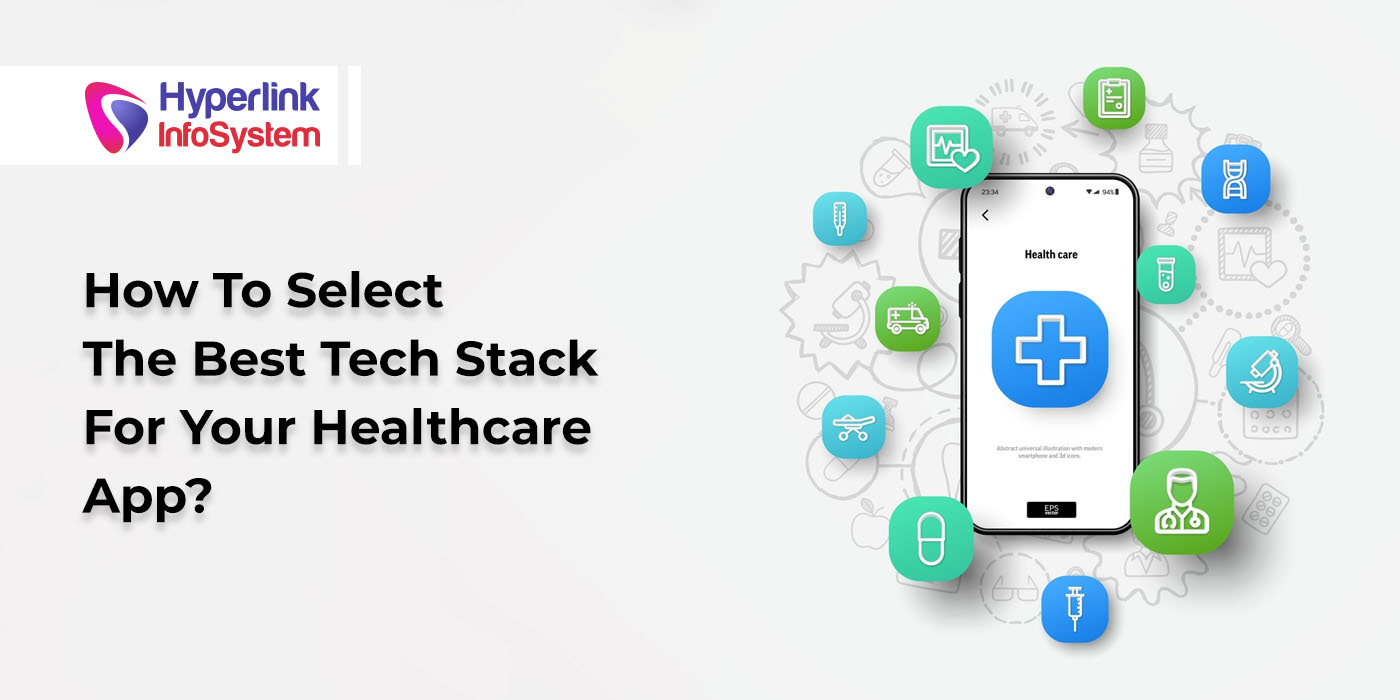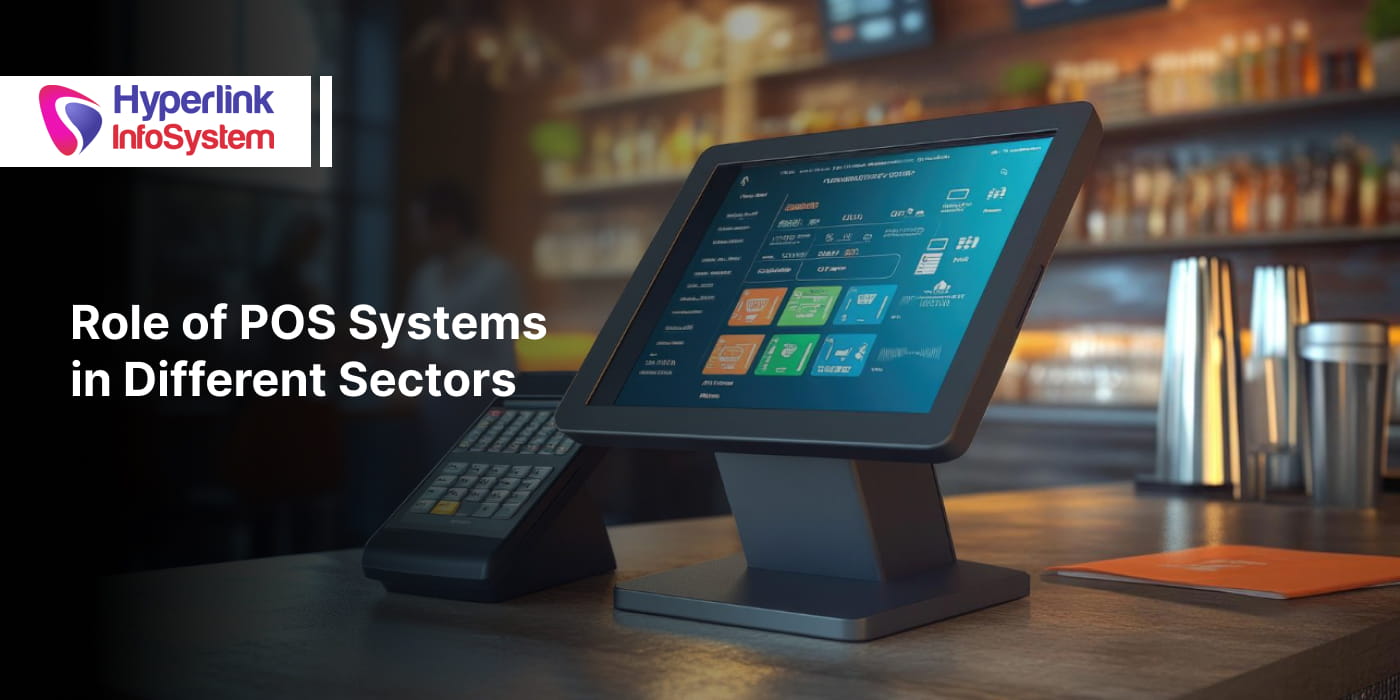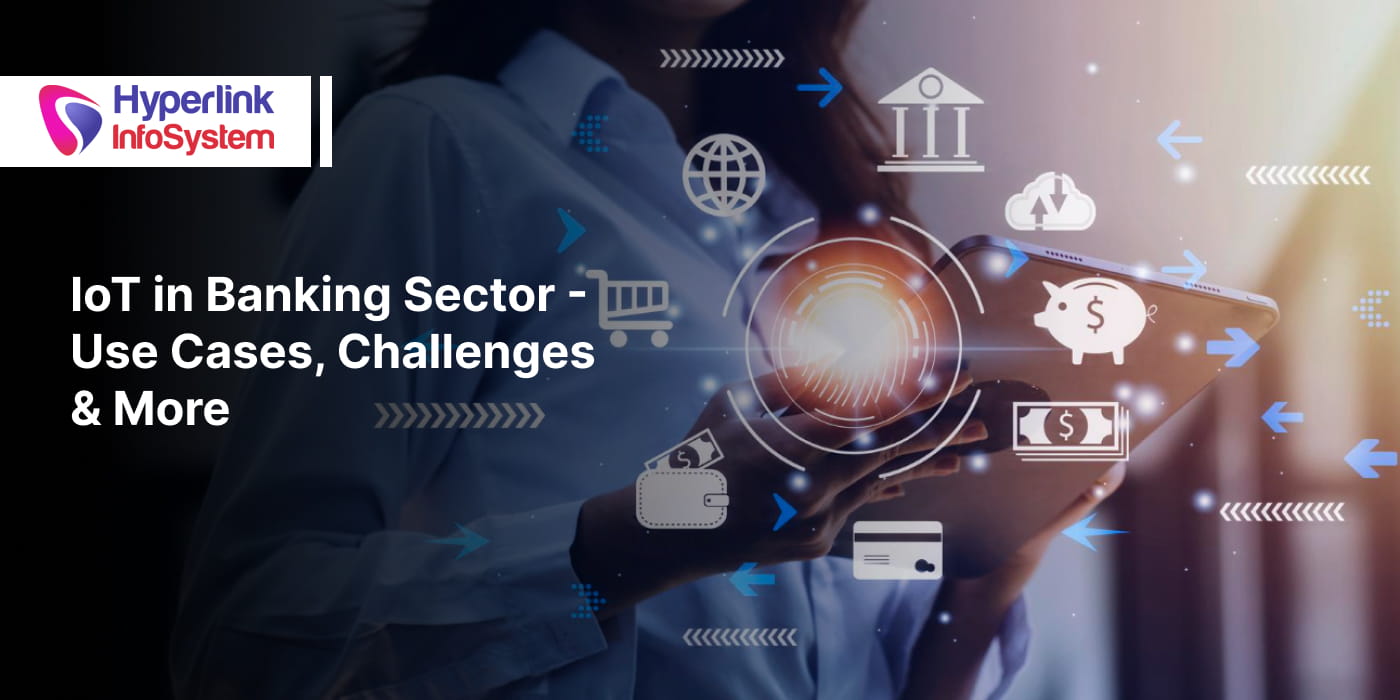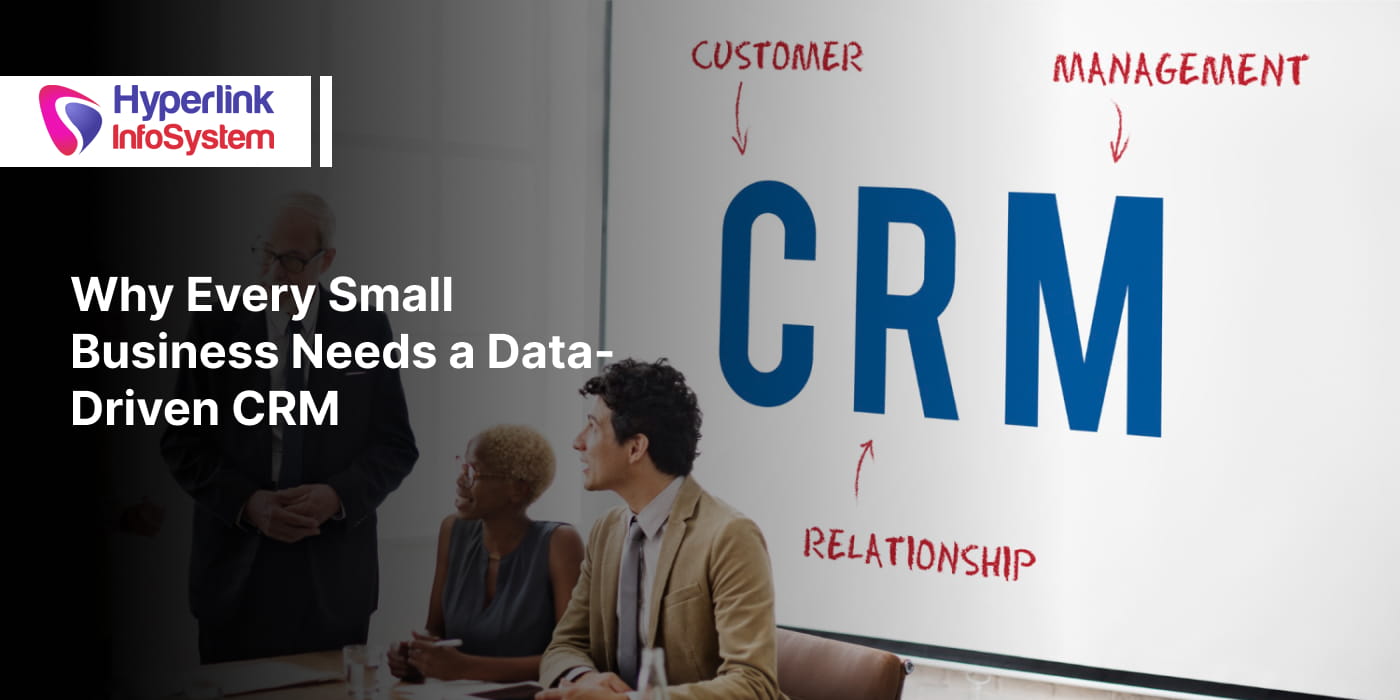The healthcare industry in 2024 has come a long way from the earlier days when medical assistance remained just limited to a few. From online medicine delivery to healthcare app development trends there are so many things happening at once in the healthcare industry. However many healthcare app developers still lack a sense of base foundation when it comes to choosing the right tech stack for developing a healthcare app. In this brief blog, we shall discuss all about the healthcare industry, technology, trends, and more. Let’s jump right in and get started on this health tech journey.
Table Of Contents
-
An Overview of the Healthcare Market
-
What Is Healthcare App Development & Its Importance?
-
Types of Healthcare App Development Trends
-
What is Tech Stack?
-
How to Choose the Right Tech Stack for Healthcare App?
-
Types of Tech Stack for Healthcare App Development
-
Legal Compliances for Healthcare App
-
How Can Hyperlink InfoSystem help?
-
Conclusion
-
FAQs
An Overview of the Healthcare Market
The healthcare industry is a massive opportunity that will never run out of ongoing digital transformations. Healthcare, in general, has become more reasonably priced and available to the public, especially, people dwelling in third-world countries. The need for truly inclusive
healthcare became a mandate since the dawn of COVID-19 causing a hefty amount of unexpected death rates. This further led to many companies focusing on pharmacy app development instead of just healthcare mobile app development.
Mobile healthcare apps offer a convenient platform to seamlessly connect doctors and patients across the globe. Although the current apps in the healthcare industry enable physicians to derive precise treatment and diagnosis, there's a lot more remaining to be explored. Creating a healthcare app demands an ample amount of technical plus legal proficiency, meticulous planning, and specialized assistance. Identifying the significance of the healthcare app development tech stack, companies across the globe are working on apps that can perform effortlessly with multiple cross-platform devices, especially, smartphones.
When it comes to the development of any mobile app, the consumers aren't aware of the possible outcomes. Hence, we are going to cover every vital aspect when it comes to healthcare app development trends and what goes into building an efficient healthcare app.
What Is Healthcare App Development & Its Importance?
Healthcare app development refers to the designing and development of mobile apps designed particularly for the health sector. These applications cater to a diverse arena, ranging from the basics of patient engagement and chronic disease management, to digital doctor consultations and medical operations optimization. Its ideal purpose is to improve health outcomes, enrich patient care and experience, and streamline healthcare workflows. A robust healthcare app in 2024 offers numerous strategic advantages:
Improved Patient Engagement
Healthcare apps enable patients to actively track and participate in their treatment, automatically leading to improvised adherence to care plans and overall diagnosis.
Increased Convenience
Healthcare Technology apps break all geographical barriers, which makes healthcare information accessible and services more convenient plus readily available to patients anytime, anywhere.
Better Operational Efficiency
When it comes to healthcare mobile app development, well-designed solutions can effectively eliminate manual, mundane, and repetitive administrative tasks. From streamlining appointment scheduling to facilitating communication between patients and providers, healthcare apps boost productivity and save additional expenses.
Branding & Differentiation
The healthcare industry requires a definitive set of health tech stack to create an app that also matches the current
healthcare app development trends. Only then your app can serve as a powerful branding tool, representing your company's commitment to innovative care and alluring new patients.
Types of Healthcare App Development Trends
With trends ruling over every possible industry in the tech segment, apps fulfilling diverse needs are not an uncommon phenomenon. The healthcare mobile app development encompasses a mass range of categories, including;
-
Fitness & Wellness Apps: This is one of the popular domains when it comes to healthcare industry trends. These applications are designed for daily usage like tracking fitness goals, maintaining diet, analyzing sleeping patterns, and monitoring chronic health conditions.
-
Hospital Management Apps: These apps have become a game changer in the patient-provider community. From streamlining mundane administrative tasks to improving scheduling, it also takes care of allocating resources plus communication.
-
Medication Reminder Apps: These apps are designed for patient care on a real-time basis and generally function on smartphones. The main goal of these applications is to send notifications to patients while ensuring they take their respective medications on time while adhering to prescribed dosages.
-
Telemedicine Apps: This category ranks on top when it comes to healthcare app development trends. The platform designed in these apps enables convenient remote consultations with healthcare professionals using video conferencing, AI chatbots, and other digital channels.
-
Medical Record Management Apps: These apps elevate healthcare technology to the next level by allowing patients to securely access and share their medical records with their respective and authorized providers.
What Is Tech Stack?
Tech stacks are a collection of technologies that are stacked together to develop a web application. It's also known as technology infrastructure, net stack, or even solutions stack. Selecting a tech stack is crucial while focusing on healthcare app development to build an app that is effortless to maintain and retains scalability.
Tech stacks help you define the type of application you need to develop, along with the resources you require to add new features and customize it further. The most commonly used stacks are a blend of Apache(thrift databases and HTTP server), JavaScript (for user interface), MongoDB (curating database), and Python (programming language). Although, contemporary tech stacks are made of many more components, due to the massive volume of data that requires processing along with the multiple devices factor that users utilize to access web servers.
In the future, when you hire dedicated app developers, you might need to include certain programming tools that take care of- BI, event processing, cloud-based hosting solutions, performance monitoring, containerization plus analytics. Hence, whichever tech stack you choose has to cater to the right technology for your particular healthcare app development.
Coming to tech stack examples in web app development, the MEAN (MongoDB-Express-Angular-Node.js) stack has proved to be an asset time and again. Many
healthcare app developers also use React instead of Angular to gain access to the MERN stack due to its immense popularity in the single-page app plus other web app development categories.
Node.js takes care of runtime, Express is a vital part of web frameworks that are built over Node.js and MongoDB is your data portal that converts data into a more usable format. The common technology between MERN & MEAN JavaScript makes it easy for
dedicated app developers to learn and utilize. Another prominent tech stack is LAMP (Linux, Apache, MySQL, and PHP) which is a combination of technologies that can be both backend plus frontend or even a blend of both i.e. full stack.
How to Choose the Right Tech Stack for Healthcare App?
There is no one definitive tech stack for application development, but we can help you with some options that’ll make your tech stack selection a little more convenient. Choosing your tech stack entirely depends on the nature of the app you're building. But to ease your minds, here are some key factors to consider before developing a healthcare app.
-
Purpose of the application
-
User-friendly interface and design
-
Overall resource and development cost
-
App scalability and optimization
-
Patient data security management
Types of Tech Stack for Healthcare App Development
Now let's discuss the technologies that are utilized by healthcare developers to stay updated with healthcare app development trends:
1) iOS App Development
When companies
hire iOS app developers the primary knowledge they look for is Swift. Launched way back in 2014 by Apple, Swift allows programmers to develop excellent applications with solid code standing behind them. Swift's understandable syntax makes it easy to use, learn, read, and write. In healthcare app development, security is a primary concern but Swift diminishes the same due to its statically typed language.
Swift also renders developers with automatic memory management that helps your dev team curate a more time-saving and productive strategy to utilize for more successful cross-platform app development. This technology has been open-source since 2015, making it open for a plethora of experts to dive in and add value.
2) Android App Development
When you're
looking to hire Android app developers, the two main programming skills to examine are Java and Kotlin. Kotlin was developed as an analog of Java but hasn't retained its prominence since. The major and only difference here is that Kotlin supports Android Studio. Java is a simple technology that helps developers with transparent syntax and semantics. Additionally, it offers impeccable security, and due to its prominent mechanisms and maintenance, it's extremely challenging to bypass or hack.
When it comes to healthcare mobile app development, having a robust code-reliant portal is crucial, which will prioritize medical data above anything else. Java has an in-built compiler for detecting issues in code before execution helps you save time and resources, and terminates the possibility of memory failures along with additional issues via its runtime control. Since Bytecode enables easy device interpretation, Java renders complete independence from hardware and operating systems.
Java and javascript library is an exhaustive one and can seamlessly transfer volumes of data using the following net protocols- TCP/IP, HTTP, & FTP. Another feature of Java is it offers developers efficient networking functions which further helps apps easily find objects within the network without accessibility issues.
3) Cross-Platform App Development
Cross-platform app development poses an arena of programming languages for developers to play with and experiment with. The most prominently used are Flutter, Xamarin, and React Native. Choosing from one of these requires research on the nature of the healthcare app you're going to develop. Let's look at them individually:
-
React Native: Apart from being extremely versatile, React Native permits developers to implement apps for several operating systems using the same code. Changes made to the JavaScript code can be updated easily without releasing a new download update on Play or App Store.
-
Flutter: Developed by Google, this open-source framework is completely written in Dart. Its flexible and explicit interface makes it prompt and efficient. Flutter's architecture renders complete personalization and exhaustive rendering plus design. In addition to this, it provides easy updates along with new features based on customer feedback.
-
Xamarin: Xamarin supports Windows, Android, iOS, UWP, and Tizen and if you wish to develop additional platforms then the community is working to expand it for GTK, WPF, & MacOS. This open-source technology uses .Net to curate iOS, Windows, and Android applications. To offer easy access to native app development APIs, Xamarin lets programmers devise a single code base for all platforms.
4) Third-Party Integrations
Whenever you acquire a project with a healthcare app development company, this is the first thing that'll happen in the meeting. Your technology should be comfortable enough to integrate with third parties to provide more flexibility, and scalability, and enhance performance for both care providers and patients. Whenever you're building a tech stack for healthcare apps, consider the following integration technologies:
-
Google Maps integration
-
Video call APIs
-
Safe payment APIs
-
EMR/EHR integration for real-time medical data accessibility
-
Patient portal integration
-
Scheduling management
-
Revenue cycle management
-
Insurance reimbursement APIs
Avoid crucial vulnerabilities and security breaches to keep the medical data far away from risk.
Legal Compliances for Healthcare App
Now that you've created the best online medicine delivery app, the excitement of launching it is immeasurable. However, before you blastoff and focus on hiring app developers, or start working on another online medicine delivery application, ensure you meet all the compliances, certifications, and regulations:
-
HIPAA: The Health Insurance Portability and Accountability Act or HIPAA is important for any healthcare app development company that deals with PHI (Protected Health Information). The only exception here are personal health apps.
-
GDP: The General Data Protection Regulation defines how you can and cannot utilize patient data or any medical information that can identify a person, email address, IP address, and so on.
-
HL7: HL7 is a seven-level norm that illustrates a layout for the interchange of all medical data.
How Can Hyperlink InfoSystem Help?
When it comes to choosing a
healthcare app development company, it's vital to choose a firm that has experience with mobile app development. Healthcare app development is a tricky and daunting process starting from being proficient in healthcare technology to hiring dedicated app developers. That's when we step in to eradicate all your setbacks or pitfalls. At Hyperlink InfoSystem, we eliminate your need to separately hire Android app developers or even hire iOS app developers.
We take care of the entire process from development to execution of your healthcare app. Whether your goal is to
build best online medicine delivery app or become the most suitable healthcare app development company, our comprehensive suite of solutions smoothly cater to all your needs. Our extensive mobile app development services have made us a household name in the USA & India since 2011. Healthcare app development in general requires extensive expertise, a well-reliable tech stack, and a group of app developers who have experience with healthcare app development services; we've got just that and so much more.
Apart from the experience our approach towards healthcare in tech is pretty realistic, inclusive, and accessibility-focused. Our team's ample strength specializes in tech stacks like node.js and react.js that amplify pharmacy app development even more efficiently. Whether you're a patient or care provider, we customize your solution as per the latest healthcare trend while also not losing track of your business goal in general. Help us, help you realize your fullest potential in healthcare technology and deliver a data-driven result.
Conclusion
In the end, we have summarised pretty much what is inculcated into healthcare app development trends, and what kind of tech stack knowledge you should look into when hiring Android app developers & iOS app developers. We have already determined what goes into building a solid health stack, and what compliance regulations to meet while launching your mobile app development project.
If you're looking to hire dedicated app developers or even possess special requirements such as hiring iOS app developers, then do not hesitate to out to our amazing team at Hyperlink InfoSystem. We assist you with everything from strategizing to implementation and make your app development for the healthcare process a smoother one.























